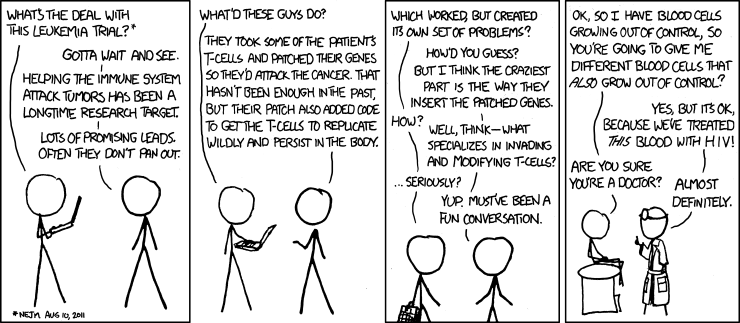Flipping through my new journals and trying to shake off a monster exam, I came across this amazing little article. The short version is that the New England Journal of Medicine has reported three patients successfully treated for Chronic Lymphoid Leukemia by injecting modified T-cells to knock down the B cells which were getting out of hand. (For simplicity: T-cells are immune cells which can "order" other cells to attack or force our own cells to commit suicide if they look "wrong" somehow. B cells - which are also immune cells - are the problem in CLL.) Two patients show complete remission, and a third showed considerable improvement.
Now, what specializes in modifying T-cells? HIV.
These doctors successfully modified HIV to create a vehicle for modifying T-cells. These modified T cells have not shown any toxic effects to patients in the past. Now, the experience of receiving this therapy looks pretty miserable, with whole body inflammation and reparable kidney injury. However, keep in mind 2 of the 3 patients had complete remission of leukemia.
The treatment is still in very early clinical trials. The authors speculate by altering the target for the T cells, this may become a new and powerful anti-cancer intervention. May. Phase 1 clinical trials are a long way off from common practice.
Warning: a decent background in the relevant topics might be necessary here.
http://www.nejm.org/doi/full/10.1056/NEJMoa1103849?query=featured_home&#t=article
And since everyone's managing to butcher this one while we're at it: here's MIT's official announcement on DRACO. http://www.ll.mit.edu/news/DRACO.html If you were asking about DNA viruses (my first question), MIT reports it works on adenoviridae, which are ds-DNA viruses. So yes - so far. It has not been tested on humans and clinical trials take a long time, so keep the champagne corked, but on ice.
Now, what specializes in modifying T-cells? HIV.
These doctors successfully modified HIV to create a vehicle for modifying T-cells. These modified T cells have not shown any toxic effects to patients in the past. Now, the experience of receiving this therapy looks pretty miserable, with whole body inflammation and reparable kidney injury. However, keep in mind 2 of the 3 patients had complete remission of leukemia.
The treatment is still in very early clinical trials. The authors speculate by altering the target for the T cells, this may become a new and powerful anti-cancer intervention. May. Phase 1 clinical trials are a long way off from common practice.
Warning: a decent background in the relevant topics might be necessary here.
http://www.nejm.org/doi/full/10.1056/NEJMoa1103849?query=featured_home&#t=article
And since everyone's managing to butcher this one while we're at it: here's MIT's official announcement on DRACO. http://www.ll.mit.edu/news/DRACO.html If you were asking about DNA viruses (my first question), MIT reports it works on adenoviridae, which are ds-DNA viruses. So yes - so far. It has not been tested on humans and clinical trials take a long time, so keep the champagne corked, but on ice.

